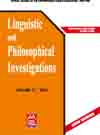JAMES’S THEORY OF UNIVERSALS: AN APPROACH FOR LEARNING
JAMES’S THEORY OF UNIVERSALS: AN APPROACH FOR LEARNING
Author(s): Mark MallerSubject(s): Education
Published by: Addleton Academic Publishers
Keywords: concepts; conceptualism; realism; learning theory; universals; images
Summary/Abstract: Most philosophers and educators are not familiar with James’s theory of universals, especially how it applies to learning concepts. His theory is an integral aspect of his epistemology, which is useful for understanding how children and adults learn and remember new concepts. James discusses and refers to his theory of universals throughout his career, but he never fully develops it. This paper defends the view that conceptualism is most consistent with his basic empiricism, developed from his Principles of Psychology and is his true position. Some critics argue that nominalism or Platonic realism are closer to his position, but this paper rejects those views as atypical or unrevised ideas of James’s thought. Bruner’s theory of concepts is also considered.
Journal: Linguistic and Philosophical Investigations
- Issue Year: 2012
- Issue No: 11
- Page Range: 62-73
- Page Count: 12
- Language: English
- Content File-PDF

